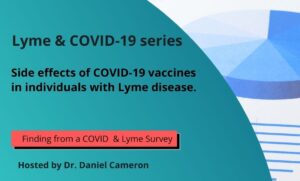
Cases of Lyme Disease with COVID-19
A 16-year-old girl with a history of a tick bite, erythema migrans rash, Bell’s palsy and a swollen knee. Her Lyme disease test was positive with 5 of 10 IgG Western blot bands. She had been ill for five years. She had also been diagnosed with chronic fatigue and Post -Treatment Lyme disease Syndrome (PTLDS). She had been treated for 3 years with oral and IV antibiotics as well as supplements. She reported being chronically ill from Lyme disease but was not being treated with antibiotics at the time of the Survey.
Her COVID-19 was confirmed by nasal swab. She was not hospitalized but had fever, fatigue, and headache and some limitations on activities due to her illness. She was ill more for than a month.
She felt that her history of a tick-borne illness made her acute COVID-19 illness worse. She developed long COVID.
Her GSQ-30 score was 68 out of 120, indicating a high symptom burden. Her worst symptoms were feeling fatigued or having low energy, feeling worse after normal physical activity, needing more sleep than usual, not feeling rested on wakening, discomfort with normal light or sound, changes in visual clarity or trouble focusing, hot or cold sensations in extremities, irregular or rapid heartbeats, feeling irritable, sad, feeling panicky, anxious, or worried, trouble finding or retrieving words, trouble with memory, and slower speed of thinking.
A 28-year-old woman with a history of a swollen knee but no tick bite or rash. She was exposed to ticks through her work, exposure to dogs and a cat that went outdoor, horses, and hiking. Her Lyme disease revealed positive IgG Western blot tests but did not meet the CDC diagnostic criteria. She had been ill for 12 years and had been since the age of 16. She had also been diagnosed with chronic fatigue. She had been treated for 8 months with oral antibiotics as well as magnesium. She reported being chronically ill at the time of the Survey. She was not being prescribed any antibiotics at the time of the survey.
She was not hospitalized but had significant limitations on activities due to her illness. She described her 14-day acute illness.
“I was diagnosed October of 2020 with COVID 19. I was very weak; I had a hard time doing daily tasks. I had GI problems, lethargy, headaches, shortness of breath, inability to exercise, and tightness in my chest.”
“I was seen at the ER, where I had radiographs of my lungs taken and low SPO2. They sent me home with a rx inhaler. I was sick for 14 days and quarantined for another 7 days.”
She described her long COVID as “POTS, random tachycardia, eye/vision changes that presented as a TBI [Traumatic Brain Injury], memory issues, seizure/stroke like activity that renders me unable to talk. During these episodes I have a racing heart rate, memory issues/trouble keeping track of time, I feel disconnected from the world, cognitive impairment. I have now developed anxiety during these episodes. For 24-48 hours post episode I cannot use critical thinking, or drive, averaging 1-2 episodes a week. They last between 10-20 minutes now.”
Her GSQ-30 score was 95 out of 120. Her worst symptoms were backache, headache, stiff or painful neck, muscle aches or pains, feeling fatigued or having low energy, feeling worse after normal physical activity, needing more sleep than usual, not feeling rested on wakening, skin or muscle twitching, discomfort with normal light or sound, balance problems or sense of room spinning, changes in visual clarity or trouble focusing, lightheadedness or feeling uncomfortable on standing, hot or cold sensations in extremities, irregular or rapid heart-beats, trouble finding or retrieving words, trouble with memory, and slower speed of thinking.
COVID-19 and Lyme disease patients
HIGHLIGHTS
Question: What is the clinical presentation of someone with a history of Lyme disease who have contracted a COVID-19 infection?
Findings: This cross-sectional Survey reveals a high symptom burden in 1168 individuals with a history of Lyme Disease. The symptom burden was the highest for the 288 individuals with a history of Lyme disease and a COVID-19 infection. Nearly one in five individuals with a history of COVID-19 and Lyme disease developed long COVID. Twenty were hospitalized.
Meaning: Individuals with a history of Lyme disease and COVID-19 have a high symptom burden and are at increased risk of hospitalization and long COVID.
Links to Lyme and COVID-19 series
- Severity of Lyme disease in a COVID-19 pandemic
- A 16-year-old girl and a 28-year-old woman with a history of Lyme disease shared their experiences after contracting COVID-19 – case discussion
- The experiences of individuals with a history of Lyme disease who contracted COVID-19
- 28-year-old woman with a history of Lyme disease describes side effects following her COVID-19 vaccine – a case discussion
- Side effects of COVID-19 vaccines in individuals with Lyme disease
- A 45-year-old woman who has been hesitant to take the COVID-19 vaccine. Next Lyme science blog
- Concerns of individuals with a history of Lyme disease who have been hesitant or have refused to take the vaccine. next Lyme science blog



This is an exceptionally important survey and article. Besides pointing toward the susceptibility that Lyme patients have toward long haul Covid ( twice the risk pointed toward here), there are implications of serious viral impacts on long haul ( chronic) Lyme that further validates patients claims that two weeks of doxycycline is not an adequate protocol for those with tick borne illness. Imagine that someone with a broken leg has their ankle set and the cast taken off about three days later, and if they complain of pain afterwards they are sent to a psychiatrist? That is what chronic Lyme patients feel when their complaints are dismissed. Altered immune systems ( many describe chronic Lyme as a B cell type of HIV), and co infections, especially bartonella which becomes an opportunistic infections once the immune system is crippled, and is easily caught from domestic animals etc., are being ignored. Indeed we need accurate Lyme tests ( such as a cross sectional survey of the general population using accurate testing ) to know the true prevalence. Since Borrelia B has been repeatedly proven to be an STD, our community should demand a similar budget as HIV. This ignoring of what might be a driving factor in bankruptcy of our National and perhaps global health care budget needs to stop.
I have been particularly concerned that someone with Lyme disease or related tick borne infection might be dismissed as long covid.
At least, maybe then we’ll get some help!
What do you suggest for treatment of chronic Lyme with symptoms? Can we ameliorate some of the burden?
I often identify treatment options that are overlooked during my patient evaluations. I always advise working with a doctor with experience treating Lyme disease in addition to other doctors if they remain ill.
I think it would be VERY interesting for a study to evaluate if long Covid patients test positive for Lyme Disease with a blood culture (not the useless CDC Western blot that results in 71% false negatives at best, BALF 2020).